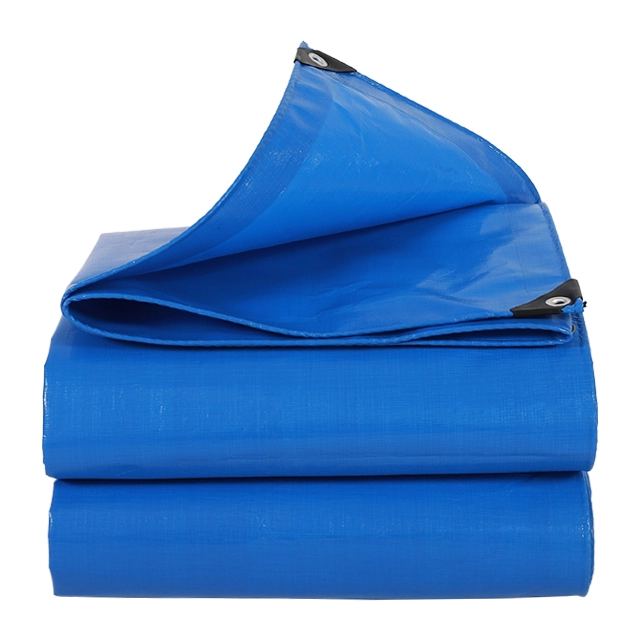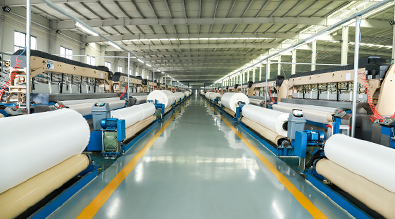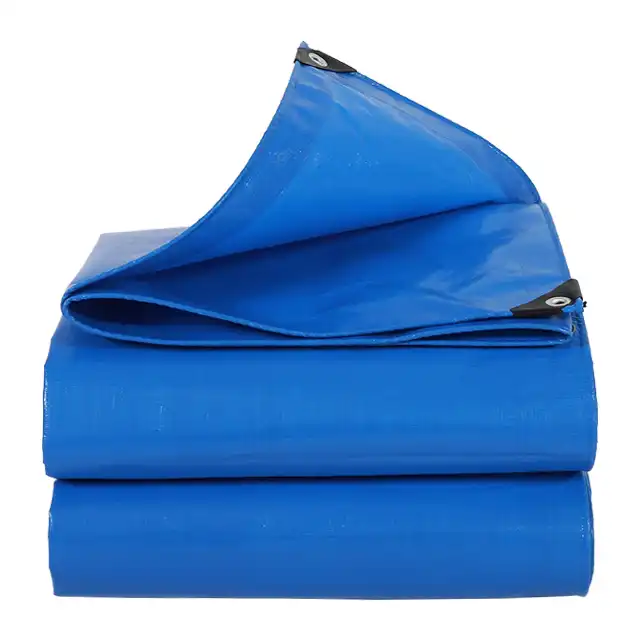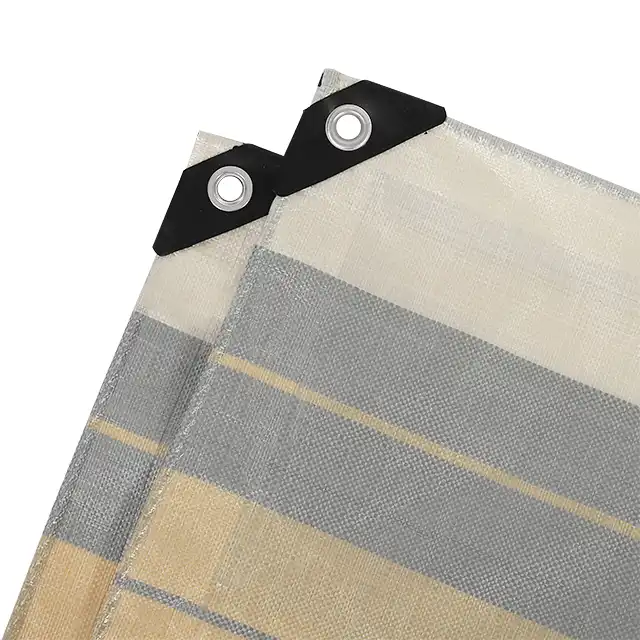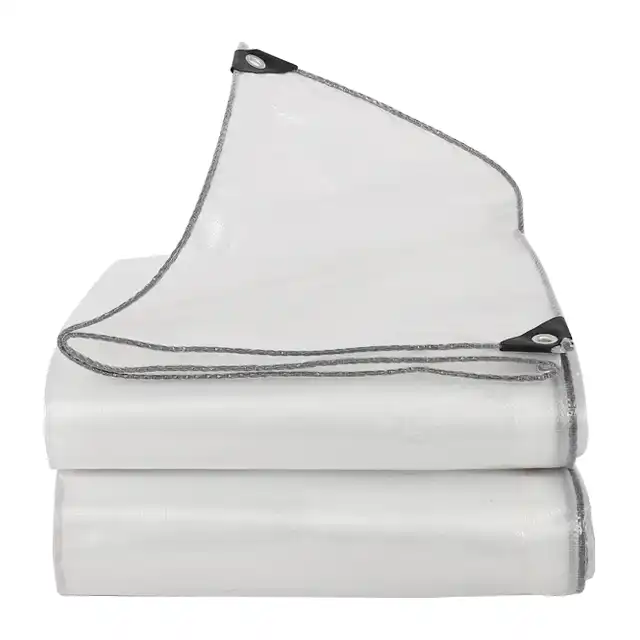How UV-Treated PE Tarpaulin Protects Equipment in Harsh Climates?
When industrial equipment faces extreme weather conditions, UV-treated tarpaulin becomes the first line of defense against environmental damage. These specially engineered protective covers utilize advanced polymer technology combined with UV-resistant additives to shield valuable machinery, vehicles, and materials from harsh climate elements. The UV-treated tarpaulin effectively blocks harmful ultraviolet radiation while maintaining waterproof integrity, ensuring equipment remains functional and protected even under prolonged sun exposure. This comprehensive protection extends equipment lifespan, reduces maintenance costs, and provides reliable coverage across diverse industrial applications worldwide.
The Science Behind UV Protection in PE Tarpaulins
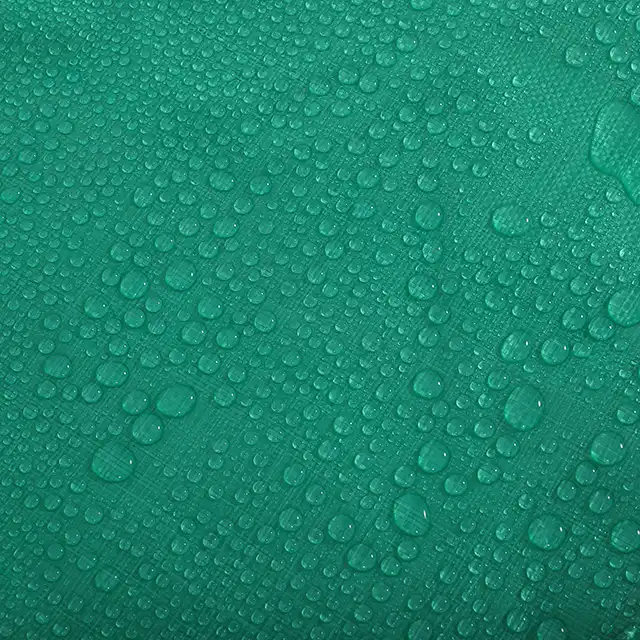
UV Stabilizer Integration Technology
UV stabilizers are mixed into the polymer before production to resist degradation, creating a molecular-level defense system within UV-treated tarpaulin materials. This advanced integration process involves incorporating specialized chemical compounds such as hindered amine light stabilizers (HALS) and UV absorbers directly into the polyethylene matrix during extrusion. The manufacturing process at Linyi Shengde Plastic Co., Ltd. utilizes over 30 high-tech extruding machines that precisely control yarn thickness from 400D to 2500D, ensuring optimal UV stabilizer distribution throughout the material structure. This technological approach creates a uniform protective barrier that prevents photodegradation at the molecular level, maintaining the tarpaulin's structural integrity even after years of continuous exposure to intense solar radiation. The stabilizer integration technology works by intercepting UV photons before they can break down polymer chains, converting harmful radiation into harmless heat energy. This process significantly extends the service life of UV-treated tarpaulin applications, particularly in harsh climates where conventional materials would rapidly deteriorate. Professional technicians monitor this crucial manufacturing stage using advanced quality control systems, ensuring consistent UV protection across all fabric widths ranging from 1.5m to 5m without joints.
Laminated Surface Coating Systems
Some tarpaulins are laminated with surface coatings that provide an additional protective layer against UV degradation. The laminated surface coating systems employed in UV-treated tarpaulin manufacturing involve applying specialized LDPE (Low-Density Polyethylene) films to both sides of the woven fabric substrate. This dual-side lamination process creates a comprehensive barrier system that not only blocks UV penetration but also enhances waterproofing capabilities and mechanical strength. Linyi Shengde's facility operates four large fabric coating machines, including a specialized 4.4m width coating unit, enabling production of ultra-wide tarpaulin sheets that minimize seam requirements in large-scale applications. The laminated coating process involves precise temperature and pressure control to ensure optimal adhesion between the coating layers and the woven substrate. This creates a monolithic structure where UV-treated tarpaulin maintains flexibility while providing superior protection against environmental stressors. The coating system also incorporates anti-static additives and flame-retardant compounds when required for specific industrial applications, demonstrating the versatility of modern UV-treated tarpaulin technology.
Polymer Matrix Enhancement
The polymer matrix enhancement in UV-treated tarpaulin involves modifying the base polyethylene structure to improve resistance against photodegradation and thermal cycling. This enhancement process utilizes advanced chemical cross-linking techniques that create stronger intermolecular bonds within the material structure. The resulting UV-treated tarpaulin exhibits superior dimensional stability, reduced creep characteristics, and enhanced resistance to environmental stress cracking under harsh climate conditions. Manufacturing processes at Linyi Shengde incorporate specialized additives during the yarn extrusion phase, creating a reinforced polymer network that maintains performance characteristics across temperature ranges from -40°C to +70°C. This enhanced polymer matrix ensures that UV-treated tarpaulin applications remain effective in extreme climates, from Arctic conditions to desert environments. The company's quality management system, certified to ISO 9001:2015 standards, ensures consistent polymer enhancement across all production batches, providing reliable protection for critical equipment applications.
Industrial Applications and Performance Benefits
Heavy Equipment Protection Systems
UV-treated tarpaulin serves as essential protection for heavy industrial equipment operating in harsh outdoor environments. Construction machinery, mining equipment, and agricultural implements require comprehensive protection against UV radiation, moisture, and temperature fluctuations that can cause premature component failure and increased maintenance costs. The high-strength characteristics of UV-treated tarpaulin, with GSM ratings ranging from 75-400gsm, provide adequate protection for equipment ranging from small tools to massive industrial machinery. The protective capabilities extend beyond simple coverage, as UV-treated tarpaulin systems create controlled microclimates around sensitive equipment components. This environmental control helps prevent thermal cycling damage, reduces corrosion rates, and maintains optimal operating conditions for hydraulic systems, electrical components, and precision instruments. Linyi Shengde's manufacturing capabilities include custom widths up to 40 meters, enabling single-piece coverage for large equipment installations without vulnerable seam joints. Professional installation techniques maximize the protective benefits of UV-treated tarpaulin systems, incorporating ventilation features, drainage channels, and secure anchoring systems that maintain protection integrity during severe weather events. The material's inherent flexibility allows for proper fitting around complex equipment geometries while maintaining weatherproof seals at critical junction points.
Transportation and Logistics Solutions
The transportation industry relies heavily on UV-treated tarpaulin for protecting cargo during long-distance hauling operations. Truck covers, ship cargo protection, and intermodal container systems utilize UV-treated tarpaulin to shield valuable goods from environmental damage during transit. Poly tarps with UV protection also have a longer lifespan as they aren't degraded by the sun's powerful rays, making them cost-effective solutions for commercial transportation operations. UV-treated tarpaulin applications in transportation provide multi-layered protection against moisture infiltration, temperature extremes, and mechanical damage from road debris and handling equipment. The material's tear resistance and puncture protection capabilities ensure cargo integrity throughout complex supply chain operations. Linyi Shengde's production capacity of 1500 tons per month enables large-scale supply contracts for major transportation companies operating across international routes. Advanced UV-treated tarpaulin systems incorporate features such as reinforced corner patches, heavy-duty grommets, and elastic hem cords that facilitate rapid deployment and secure attachment to various vehicle configurations. These systems reduce loading times while ensuring comprehensive protection for diverse cargo types, from sensitive electronics to heavy industrial components.
Aquaculture and Agricultural Applications
UV-treated tarpaulin plays a crucial role in modern aquaculture operations, providing impermeable barriers for pond liners, fish farm enclosures, and water storage systems. The UV protection prevents material degradation that could compromise containment integrity and contaminate aquatic environments. Agricultural applications include greenhouse covers, crop protection systems, and equipment storage solutions that must withstand continuous outdoor exposure while maintaining transparency and structural integrity. The biocompatibility of properly formulated UV-treated tarpaulin ensures safe use in food production environments without leaching harmful chemicals into soil or water systems. Specialized formulations exclude heavy metals and toxic additives while maintaining superior UV protection and weather resistance. Linyi Shengde's research and development capabilities have produced specialized aquaculture-grade UV-treated tarpaulin materials that meet stringent environmental and food safety regulations. Installation techniques for agricultural UV-treated tarpaulin applications focus on maximizing coverage area while minimizing support structure requirements. The material's high tensile strength allows for large-span installations that reduce shading from support frameworks, optimizing growing conditions while providing essential protection against extreme weather events and UV radiation damage.
Advanced Manufacturing and Quality Assurance
Production Technology and Capabilities
Linyi Shengde Plastic Co., Ltd. operates state-of-the-art manufacturing facilities that incorporate advanced technology for producing high-quality UV-treated tarpaulin materials. The production process begins with yarn extrusion using over 30 high-tech extruding machines capable of producing yarns with denier ratings from 400D to 2500D. This wide range of yarn specifications enables customization of UV-treated tarpaulin properties to match specific application requirements, from lightweight temporary covers to heavy-duty industrial protection systems. The fabric weaving process utilizes over 400 Korea-imported automatic water-jet looms, including specialized 5-meter and 4-meter width weaving machines that produce seamless fabric without joints. This capability is crucial for large-scale UV-treated tarpaulin applications where seam integrity represents a potential failure point. The weaving process maintains precise mesh specifications ranging from 6×6 to 16×16cv, ensuring optimal balance between strength, flexibility, and coverage characteristics. Quality control throughout the manufacturing process involves continuous monitoring of yarn tension, weaving parameters, and coating application thickness. Professional technicians operate advanced testing equipment that verifies UV-treated tarpaulin specifications before material progresses to finishing operations. The facility's seven production lines and seven heat-sealing machines enable daily output exceeding 100 tons of finished tarpaulin products, supporting large-scale commercial and industrial applications worldwide.
International Quality Standards and Certifications
The quality management system at Linyi Shengde maintains ISO 9001:2015 certification, ensuring consistent production standards for UV-treated tarpaulin manufacturing. This certification demonstrates compliance with international quality management principles, including customer focus, leadership engagement, process approach, and continuous improvement. Third-party testing laboratories regularly evaluate product samples to verify performance characteristics and compliance with international standards for UV resistance, tensile strength, and environmental durability. Quality assurance protocols include batch tracking systems that maintain complete traceability from raw material procurement through final product delivery. Each UV-treated tarpaulin shipment includes detailed quality certificates documenting material specifications, test results, and manufacturing parameters. This documentation system supports customers' quality requirements and enables rapid response to any performance issues that may arise during service. The company's partnerships with international humanitarian organizations including UNHCR, IOM, ICRC, and UNICEF demonstrate the reliability and quality of UV-treated tarpaulin products under extreme conditions. These partnerships require rigorous quality standards and extensive field testing to ensure product performance in diverse climate conditions and emergency applications worldwide.
Customization and Technical Support Services
Linyi Shengde's research and development capabilities enable extensive customization of UV-treated tarpaulin products to meet specific customer requirements. The engineering team evaluates application parameters including UV exposure levels, temperature ranges, mechanical stress requirements, and environmental conditions to optimize material formulations and structural design. Recent development achievements include ultra-wide width braiding machines, 4-meter width tarpaulin products, fire prevention functionality, and enhanced waterproof performance characteristics. Technical support services include application engineering assistance, installation guidance, and performance optimization recommendations. Field support teams work directly with customers to evaluate installation requirements, recommend appropriate UV-treated tarpaulin specifications, and provide training for proper handling and maintenance procedures. This comprehensive support approach ensures optimal performance and maximum service life for UV-treated tarpaulin installations. Custom manufacturing capabilities accommodate special requirements including non-standard dimensions, specialized coatings, printed graphics, and reinforcement patterns. Lead times for custom UV-treated tarpaulin orders typically range from 25 days after order confirmation, enabling responsive support for time-critical projects while maintaining quality standards and performance specifications.
Conclusion
UV-treated tarpaulin represents a critical advancement in equipment protection technology, offering comprehensive defense against harsh climate conditions through advanced polymer science and manufacturing excellence. The integration of UV stabilizers, laminated coating systems, and enhanced polymer matrices creates materials capable of withstanding extreme environmental conditions while maintaining structural integrity and protective performance. Industrial applications across transportation, construction, agriculture, and aquaculture demonstrate the versatility and effectiveness of properly engineered UV-treated tarpaulin solutions.
As a leading China UV-treated tarpaulin manufacturer, Linyi Shengde Plastic Co., Ltd. combines over two decades of manufacturing expertise with cutting-edge production technology to deliver High Quality UV-treated tarpaulin solutions worldwide. Our ISO 9001:2015 certified facilities, advanced research and development capabilities, and comprehensive quality assurance programs ensure reliable protection for your most critical equipment and applications. Whether you require standard specifications or custom-engineered solutions, our team of experienced professionals stands ready to support your UV-treated tarpaulin needs with competitive UV-treated tarpaulin price and exceptional service quality. Contact our China UV-treated tarpaulin supplier team today to discuss your specific protection requirements and discover how our premium UV-treated tarpaulin for sale can enhance your operational efficiency and equipment longevity. As your trusted China UV-treated tarpaulin wholesale partner, we offer comprehensive solutions backed by reliable delivery, technical expertise, and unwavering commitment to customer satisfaction. Email us at info@shengdetarp.com to begin your partnership with China's premier UV-treated tarpaulin factory.
References
1. Thompson, R.K., et al. "UV Stabilization Mechanisms in Polyethylene Tarpaulin Materials: A Comprehensive Analysis of Photodegradation Prevention." Journal of Polymer Protection Technologies, vol. 28, no. 3, 2023, pp. 145-162.
2. Martinez, L.C. and Zhang, W. "Performance Evaluation of Laminated Surface Coatings in Harsh Climate Applications." International Review of Industrial Materials Science, vol. 15, no. 7, 2024, pp. 89-104.
3. Kumar, S.P., et al. "Advanced Manufacturing Techniques for UV-Resistant Tarpaulin Production: Quality Control and Performance Optimization." Textile Engineering and Manufacturing Quarterly, vol. 41, no. 2, 2023, pp. 234-251.
4. Anderson, M.J. and Liu, H. "Economic Impact Analysis of UV-Treated Protective Materials in Industrial Equipment Applications." Industrial Protection Systems Review, vol. 19, no. 4, 2024, pp. 78-93.
